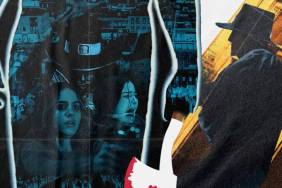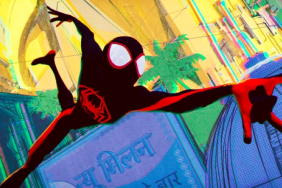
There is no direct attribution to Duke Mitchell in regards to the titular quote. However, when it comes to the lounge lizard crooner-cum-multi-hyphenate DIY film guru, its often best to print the legend. The self-anointed King of Palm Springs couldve easily been born a Mercer County mafia kid, except his parents moved him to Brooklyn at the age of eight. This is humorous when one considers that Mitchell came this close to possibly walking a criminal path, living within spitting distance of Youngstown, Ohio (which had made a name for itself in the 50s and 60s as Murdertown, USA). Car bombs were the specialty in that part of the country, as the Youngstown tune-up became nationally popular slang for the trademark termination of many small-time crooks that called the town home. Only by that time, Mitchell was miles away, learning hard lessons on the streets of NYC.
Instead of a gun, Mitchell picked up a mic in New York City, taking up singing lessons early. But the vocalist (and soon to be stage comedian) could never seem to escape the mafia, as his touring career would put him in contact with numerous made men. Where we now somewhat mythologize Martin Scorsese for never leaving his deep roots in NYCs Little Italy behind, its hard not to wonder, had Mitchell actually lived to see Goodfellas, if hed publicly piss on it in the same fashion he did The Godfather. To him, Francis Ford Coppolas epic, Shakespearian take on the rise and fall of the Corleone family was utter bullshit. Mitchell dealt in omerta his whole life, and knew there was very little romantic about it.
A closer cousin to Dukes rough, street-level style of filmmaking would be the poliziotteschi subgenre that rose to Italian cinematic prominence during the 1970s, thanks in part to filmmakers like Fernando Di Leo. Only instead of damning the petty thugs for their Caligulan indulgence in sex, drugs and violence, Mitchells movies are tinged with a sense of admiration. Why else would he cast himself as Mimi Miceli, The Executioner (which Mitchells movie was known as in Germany), who heads to Hollywood and ends up mowing down nearly everyone in his path? Its a gonzo bit of self-glorification from a huckster who was once threatened with a lawsuit by Jerry Lewis himself over Bela Lugosi Meets a Brooklyn Gorilla the shameless rip that saw Mitchell riffing with rubber-faced stage partner Sammy Petrillo. That heinous lump was a natural extension of Mitchell and Petrillos Martin and Lewis imitation; an act that Lewis son Gary recalls for Petrillos obituary as enraging his father to the point that When Sammy and the other guy played in that gorilla movie, I remember my dad and Dean saying, We got to sue these guys this is no good.
The other guy. Unfortunately, this is a pretty fitting description for an actor who kind of looked like Frank Siveros demonic uncle. Were Mitchell to have forgone his pursuit of creating celluloid slaughter, itd be hard to imagine him having much of an acting career beyond being a professional that guy, fleshing out background scenes in big budget mafia movies. Theres an argument to be made that Mitchell even knew his own on-screen limitations, as he initially tried to cast Frank Sinatra as his lead murderer in Massacre (a proposition Ol Blue Eyes turned down with a simple Duke, I love you, but I get paid real money to make real movies.). Thats not to discount Mitchells demonstrable screen presence. The man doesnt really act as much as he slithers through scenes, oozing lecherous charisma as he mumbles racial slurs and shoots other bad men in the face. Mitchell made no bones about how most of the pictures scant eighty-two minute runtime is based completely off of mafia stories his lounge lizard colleagues told him in Palm Springs. Yet his commitment to connecting at an almost molecular level to these legendary men of murder is awe-inspiring, as you can practically smell the cheap cologne, cigarettes and red wine radiating off of Mimi.

The ramshackle fashion in which Massacre Mafia Style is assembled strengthens the films down-in-the-gutter point of view. Its obvious from the start that Mitchell barely knows how to place the camera, let alone artfully frame a shot. Yet the sincere energy the picture contains in every one of these haphazardly realized tableaus allows Massacre Mafia Style to almost inadvertently become poetic and intimate. This is a mans soul, spilled onto celluloid without any real filter between his un-PC creative tendencies and the audiences delicate sensibilities. Beginning with an office bloodbath (that includes a wheelchair-bound sleaze being electrocuted via a urinal) and ending with an operatic war against West Coast pimp, Superspook (Jimmy Williams), Mitchell assaults the viewers compassions with a mean-spirited glee. In-between, were treated to dinner conversation, during which Mimi and his Mafioso pal Jolly (Vic Caesar) take jabs at movies trying to depict their made lifestyle, all while plotting to kidnap a local boss (Louis Zito) for ransom money. Were with these men until the end because, as the tagline goes, youre either in or youre in the way.
Mitchells focus on rituals contained within the Italian American culture adds layers of texture to characters who, at first, seem like rote stereotypes. But when combined with the overt Catholicism contained in both Massacre Mafia Style and his initially unfinished follow-up, Gone With the Pope, they help to provide morals to a movie that, from afar, could otherwise be viewed as nihilistic. While Massacre Mafia Style is unquestionably an exploitation picture to its very core (just look at how often Cara Salerno Mitchells fictional wife appears naked), it feels like the Brillo-haired club scene lifer is working through some profound personal issues. Its no coincidence that an alternate title to Massacre is Like Father, Like Son, as a sense of familial fatalism pervades the lives of these gun thugs, starting at the top with the very God they pray to. Mimi believes that he is destined for the same greatness his father (Lorenzo Dodo) once enjoyed before being exiled back to Sicily, and will kill anybody in order to achieve said status. Where so much of Coppolas Godfather is about Michael Corleones rejection of sin and power, Massacre Mafia Style somewhat becomes about embracing the images of the Father, both spiritual and flesh. Expanded onto a grand scale, Massacre Mafia Style could be viewed as Mitchells statement on Italian Americans as a whole an acceptance of heritage that comes with an ugly price tag you must endure in order to guarantee greatness.
This dedication to delivering a distinguished examination is really what sets Massacre Mafia Style apart from the majority of its grindhouse peers. Yes, the movie is trying to shock you. Yes, the movie is crudely constructed. Yes, youve seen these sorts of mafia tropes done with much more polish from Mitchells film school-educated peers. Yet what pictures like The Godfather and Goodfellas lack is its sense of true-life experience. There are numerous tales of Mitchell being a violent man (he even once enacted the wheelchair foot electrocution on a stage manager he was upset with, inspiring the scene). Often during Massacre, the viewer feels like theyre witnessing the product of a dangerous lunatic who, thanks to numerous singing gigs and selling the lease to a supper club, was somehow able to raise enough cash to commit his warped worldview to the silver screen. This isnt some ULCA or NYU grad playing dress up, imitating the neighborhood tough guys they admired from afar growing up. Massacre Mafia Style is genuine outsider art, delivered with a DIY flair Craig Denney (whose recently unearthed The Astrologer is one of the few films that compares in terms of sheer fuck formalism gusto) could admire.
There will be some who extoll the virtues of Massacre Mafia Style utilizing best bad movie parlance. Those people are full of shit. This is a movie made by a man who was tired of seeing his universal understandings being filtered through the lenses of those who kept people like him at arms length. The old adage usually goes write what you know. Duke Mitchell took it a step further. He filmed how he lived remorselessly true to himself. God bless Bob Murawski and Grindhouse Releasing for restoring this damaged vision of America.
—
Massacre Mafia Style is now available on Blu-ray and DVD from Grindhouse Releasing. Gone With the Pope will be released March 24.
Jacob Knight is an Austin, Texas based film writer who moonlights as a clerk at Vulcan Video, one of the last great independent video stores in the US. You can find find him on Twitter @JacobQKnight.









